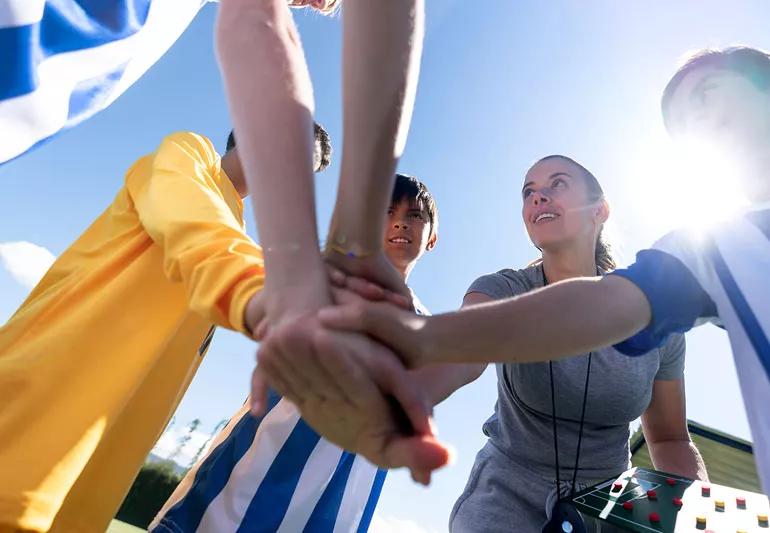What you can do to be the ideal sports parent

Image content: This image is available to view online.
View image online (https://assets.clevelandclinic.org/transform/383dd03c-fe9f-473b-94c3-7a6e243eae72/sportsParent-1128240837-770x553_jpg)
Mother coaching her sons soccer team
We’ve all heard about (or have seen) the overbearing parent who shouts too loudly at games, bullies the coach to play their child more, and every once in a while gets ejected from the game. The National Alliance for Youth Sports even has a program for parents whose members make a pledge to “bench irrational behavior in youth sports.”
Advertisement
Cleveland Clinic is a non-profit academic medical center. Advertising on our site helps support our mission. We do not endorse non-Cleveland Clinic products or services. Policy
So whether your child is extremely good at his or her sport or still struggling to do the basics, here are five tips on being a good role model and helping your child to make the most of his or her playing experience from pediatric psychiatrist Joseph Austerman, DO.
Play is the basis of how we learn everything. We have to make some mistakes along the way to learn how to do things the right way. “As a parent you are the most aware of the mistakes that your child is making,” says Dr. Austerman.
There will always be times when it feels that other children are outperforming your child while playing.
Children typically are so focused on their own play that they aren’t comparing themselves to other players. You do not want to rate your child’s performance based on others. This will introduce a sense of doubt or shame when they make mistakes and they will lose any sense of fun. Always ask first, “did you have fun.” Let them know that this is what’s most important.
There is so much to learn from sports. Being a team player is one key learning. Children will learn how they fit into a group, what their strengths are, and yes, even their weaknesses. And of course, they will learn the physical skills they need to play the game.
When teaching, Dr. Austerman advises that you highlight what your child did well. Then employ the “ask-tell-ask” model of teaching. First ask your child what they’re struggling with. Then make an observation about one or two things they could improve on. Finally, have your child tell you what they can do to improve in these areas. Always, praise your child for the things that they are doing right or they may begin to see the weaknesses first and lose the desire to learn.
Advertisement
With every sport comes the potential for injury. Kids are running, jumping, throwing, kicking and colliding with each other and with their sports equipment. A big part of playing sports is about experiencing the physicality of movement and becoming more coordinated. Help your child to pay attention by learning good sports technique, wearing the appropriate safety equipment, and watching for their teammates and the ball.
Everything in life takes time to learn. We get better with practice, and some things come more naturally than others. Sports can give you and your child the chance to learn more patience. Parents say some of the most gratifying experiences they have when watching their child play a sport is when they have a great play or do something new that they have never been able to do before.
Celebrate the little victories as well as the big ones just the same. Your child will build off of each new skill they learn. Ultimately they will learn to have resilience in the face of adversity.
Volunteer your own services when you can. Bring or bake something for the team’s bake sale. Sell raffle tickets at the games. If you can, volunteer as an assistant coach or help to manage equipment or uniforms. You will be performing a needed service for your child’s team, and you’ll get to know more parents. This will also teach your child the value of helping out.
“Your children will model your behavior ― good or bad,” Dr. Austerman concludes. “Sports are a great vehicle for teaching socialization skills and how to act with graciousness and respect.”
By following these tips, you will help your child to have a healthy and enjoyable experience with sports. And they will learn lessons they can take with them into adulthood and every aspect of their lives.
Advertisement

Delivered every Tuesday!
Sign up for our Health Essentials emails for expert guidance on nutrition, fitness, sleep, skin care and more.
Learn more about our editorial process.
Advertisement
Takeaways from sports psychology
Athletic trainers help keep student athletes safe, healthy and happy.
Counter stress and balance priorities
Protective equipment like sports cups can help avoid injury
Each child and condition is unique, but most kids can play with proper precautions
An annual exam looking at heart health
For starters, they’re not just football injuries
Type 2 diabetes isn’t inevitable with these dietary changes
Applying a hot or cold compress can help with pain
Pump up your iron intake with foods like tuna, tofu and turkey